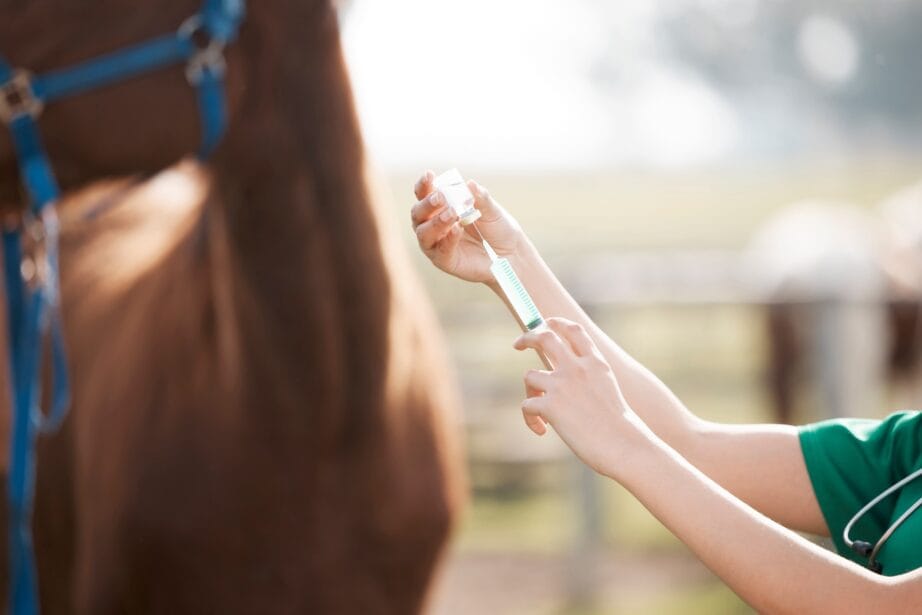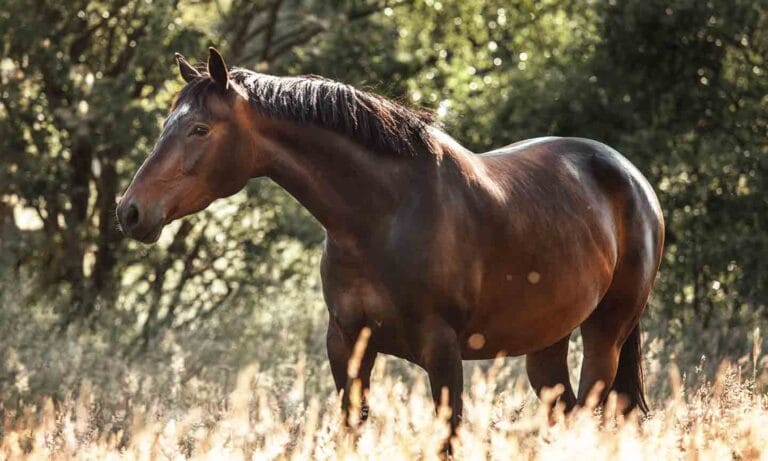Keeping your horse up-to-date on important vaccines generally only requires two vet visits and, at most, a couple of hundred dollars per year—a small investment that’s well worth the peace of mind.
In this guide, we’ll break down the six types of combination horse vaccines available and help you understand which ones you need to keep your equine partner healthy.
In This Guide:
What Do Horse Vaccines Do?
Vaccines provide active immunity to specific diseases. They work by introducing a harmless, weakened or inactive form of a virus or bacterium into your horse’s body. This teaches the immune system to recognize and fight off specific pathogens by building antibodies against them.
These antibodies then provide immunity (protection) for some time, so if the real disease-causing pathogen makes its way into the horse’s body, their immune system can quickly and effectively stop it in its tracks.
What Are the Different Types of Horse Vaccines?
Vaccines for horses are generally categorized into two main types: core and risk-based.
Core Vaccines for Horses
Core vaccines are recommended for all horses, regardless of their geographical location, travel, or lifestyle. These vaccines protect against widespread diseases that can be severe or even fatal.
Here’s a brief overview of the core vaccines every U.S.-based horse should receive, according to the American Association of Equine Practitioners (AAEP):
- Rabies: A viral disease transmitted through the saliva of infected animals, rabies is a neurological disease that is almost always fatal once clinical signs appear. Horses should receive the rabies vaccine annually. Rabies can be passed on to humans, so vaccination of your horse is a must.
- Tetanus: Caused by a toxin produced by the bacterium Clostridium tetani, tetanus in horses can lead to severe muscle spasms and death. The vaccine is typically given yearly, with an additional booster if the horse gets a penetrating wound—especially if a rusty object is involved.
- West Nile virus (WNV): Transmitted by mosquitoes, West Nile virus can cause severe neurological problems and is often fatal. Horses should receive the vaccine annually in parts of the country where mosquitoes are only active in the summer, and biannually in areas where mosquito populations are present year-round, such as Florida.
- Eastern equine encephalomyelitis (EEE) and western equine encephalomyelitis (WEE): Both EEE and WEE are serious viral diseases transmitted by mosquitoes, causing inflammation of the brain (encephalitis). Just like WNV, the EEE/WEE vaccine is usually administered once or twice a year, depending on mosquito activity.
Risk-Based Vaccines for Horses
The AAEP also recommends risk-based vaccines based on your horse’s exposure risk, which can vary depending on geographic location, travel frequency, lifestyle, and other factors. These vaccines can include:
- Equine influenza: The horse flu is a contagious viral respiratory disease. It can spread rapidly, especially in crowded environments such as horse shows. Vaccination is typically done every six to 12 months, depending on the horse's exposure risk.
- Strangles: Caused by the bacterium Streptococcus equi, equine strangles causes severe infections of the lymph nodes in the horse’s throat. Veterinarians generally recommend the vaccine annually for horses that encounter many different horses or those entering competitions.
- Equine herpesvirus (EHV): A viral respiratory disease, equine herpesvirus requires boosters every six to 12 months, depending on exposure risk. EHV-1, the most dangerous strain of the disease, can cause respiratory disease, pregnancy loss, and neurological issues. Pregnant mares need a specific sequence of EHV vaccinations before their foal is born.
- Potomac horse fever (PHF): This bacterial disease affects horses that consume water or mayflies infected with the bacterium Ehrlichia risticii. Potomac horse fever is associated with high fever, diarrhea, and laminitis. Vaccination is usually recommended annually in warmer climates where pastures border creeks or rivers.
- Botulism: Caused by the bacterium Clostridium botulinum, botulism in horses affects the nervous system and can be fatal. Vaccination is often recommended for horses in regions where the disease is prevalent or for those at risk. For example, equines that eat hay from round bales are at risk and should receive a booster annually. Round bale hay has more risk of moisture and less quality control over the fermentation process, which can lead to the perfect conditions for bacteria to thrive.
- Equine viral arteritis (EVA): EVA can cause respiratory issues, pregnancy loss, and swelling in the legs. Annual vaccination is especially important for breeding stallions and mares.
- Anthrax: Caused by the bacterium Bacillus anthracis, anthrax in horses causes severe systemic disease and is often fatal. Given annually, the vaccine can protect against this bacterial disease in regions where anthrax is a concern. Anthrax has been seen everywhere in the U.S., with highest frequency in the Midwest and West.
- Rotavirus: This gastrointestinal virus can cause severe diarrhea in foals. The vaccine is typically administered to pregnant mares to protect their foals during the first few months of life. Rotavirus is not a concern for adult horses; non-breeding animals do not need the vaccine.
- Snake bites: For horses living in areas with venomous snakes, a vaccine can preventatively help reduce the severity of symptoms from a snake bite, which can otherwise be life-threatening.
- Leptospirosis: This bacterial infection can cause a range of issues, including pregnancy loss and kidney problems. Annual vaccination is often recommended for horses in areas where leptospirosis is known to occur.
Multi-Vaccines for Horses
Multi-vaccine options can simplify and streamline your horse vaccination schedule by combining several vaccines into one shot. As always, consult your veterinarian to create a tailored vaccination plan that fits your horse’s specific risk factors and health requirements.
To help you have an informed conversation about your horse’s vaccination protocol, here are examples of the multi-vaccines available:
- PRESTIGE® 2 Vaccine for Horses:
- Equine influenza and equine herpesvirus (EHV-1 and EHV-4)
- PRESTIGE® 3 Vaccine for Horses
- Eastern and Western Equine Encephalomyelitis (EEE and WEE) viruses and tetanus
- PRESTIGE® 4 Vaccine for Horses
- Eastern and Western encephalomyelitis viruses (EEE/WEE), equine influenza, and tetanus
- PRESTIGE® 5 Vaccine for Horses
- Eastern and Western encephalomyelitis viruses (EEE/WEE), equine influenza, equine herpesvirus (EHV-1 and EHV-4), and tetanus
- EQUI-JEC® 6 Vaccine for Horses, 1-mL Syringe
- Eastern and western encephalomyelitis (EEE & WEE), West Nile virus (WNV) and tetanus, and against respiratory disease due to EHV-1 and EHV-4, and equine influenza
- EQUI-JEC® 7 Vaccine for Horses, 1-mL Syringe
- Eastern, western, and Venezuelan encephalomyelitis (EEE, WEE, and VEE), West Nile virus (WNV), tetanus, and against respiratory disease due to EHV-1 and EHV-4, and equine influenza
Share:














